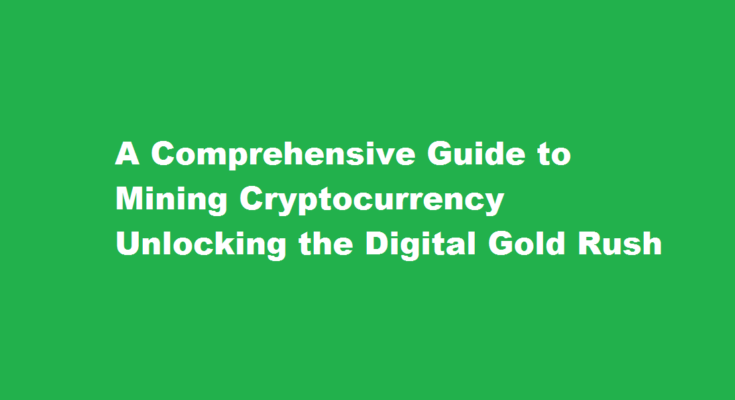Introduction
With the advent of blockchain technology, cryptocurrencies have gained significant popularity in recent years. Among the various ways to obtain digital assets, mining remains a fundamental method. Mining involves the validation of transactions and the creation of new cryptocurrency units. In this article, we will provide a unique and informative guide to help you understand the process of mining cryptocurrency and embark on your own digital mining adventure.
Understanding Cryptocurrency Mining
Cryptocurrency mining serves two essential purposes: validating transactions and adding new blocks to the blockchain. The process is carried out using powerful computers that solve complex mathematical problems. Successful miners are rewarded with a certain amount of cryptocurrency for their computational efforts.
Choosing the Right Cryptocurrency to Mine
Before starting your mining journey, it’s crucial to choose the right cryptocurrency. Factors to consider include the network’s mining algorithm, potential profitability, and future growth prospects. Bitcoin (BTC) and Ethereum (ETH) remain popular choices, but numerous other altcoins offer attractive opportunities for mining.
Hardware Requirements
Mining cryptocurrencies demands specialized hardware to handle the computational workload efficiently. The most common equipment used for mining includes ASICs (Application-Specific Integrated Circuits) for Bitcoin and powerful GPUs (Graphics Processing Units) for altcoins like Ethereum. Determining your mining hardware depends on the specific cryptocurrency you plan to mine.
Software and Mining Pools
Once you have the necessary hardware, you’ll need software to connect your mining rig to the cryptocurrency network. Popular mining software includes CGMiner, EasyMiner, and Claymore. Joining a mining pool is also advisable, as it allows miners to combine their computational power and increase the chances of mining rewards.
Creating a Wallet
To store the mined cryptocurrency securely, you need a digital wallet. Wallets come in various forms, including online, hardware, and software wallets. Each has its own advantages and security considerations. Research different wallet options and choose one that suits your needs, ensuring it supports the cryptocurrency you are mining.
Mining Process and Rewards
The mining process varies depending on the cryptocurrency. For proof-of-work (PoW) cryptocurrencies, such as Bitcoin and Ethereum, miners compete to solve complex mathematical puzzles. Once a miner finds the solution, they add a new block to the blockchain and receive a reward in the form of newly minted cryptocurrency and transaction fees.
Mining Profitability and Costs
Mining profitability depends on various factors, including electricity costs, hardware efficiency, and the price and mining difficulty of the cryptocurrency. Before diving into mining, conduct a cost analysis to ensure the potential rewards outweigh the expenses. Consider factors such as electricity consumption, cooling, and maintenance.
Security and Network Considerations
Mining exposes your system to certain security risks. Keep your mining software updated, utilize strong passwords, and be cautious of phishing attempts. Additionally, consider the environmental impact of mining and choose eco-friendly alternatives whenever possible. Some cryptocurrencies, like Ethereum, are transitioning from PoW to proof-of-stake (PoS), which consumes significantly less energy.
Staying Informed and Adapting
The cryptocurrency landscape is constantly evolving. Stay updated with the latest industry news, technological advancements, and regulatory changes. Adapt to new mining algorithms and strategies to remain competitive. Engaging in online forums and communities can provide valuable insights and support from experienced miners.
FREQUENTLY ASKED QUESTIONS
What knowledge do I need to mine crypto?
Coding is the most important skill you should acquire to become a bitcoin miner. You should validate the transactions and ensure the safety of the network to become a bitcoin miner. For this, you should learn coding. It permits you to create and update mining software according to mining needs.
Is crypto mining easy?
Although mining is a competitive business, starting is still relatively easy. In the early years of Bitcoin, hobbyists could simply boot up some software on their computer and get started right away. Those days are long gone, but setting up a dedicated Bitcoin miner is not as hard as it may seem at first.
How does mining work?
Mining is the process that Bitcoin and several other cryptocurrencies use to generate new coins and verify new transactions. It involves vast, decentralized networks of computers around the world that verify and secure blockchains – the virtual ledgers that document cryptocurrency transactions.
Conclusion
Mining cryptocurrency offers an exciting opportunity to participate in the digital revolution and potentially earn rewards. By understanding the mining process, selecting suitable hardware and software, and staying informed, you can embark on a successful mining journey. Remember to weigh the costs and benefits, prioritize security, and adapt to the ever-changing crypto landscape.
Read Also : The Ultimate Guide to Backing Up WhatsApp Chats



